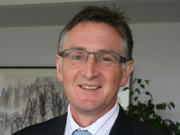CEO pay is out of control, UNI tells top corporate executives

UNI Global Union told CEO’s assembled at the annual World Economic Forum last week in Davos, Switzerland, that the global recession is not an excuse to take more money out of workers’ pockets and that their giant pay packets are unethical and unsustainable and that the fixing of CEO pay was a “racket”.
UNI General Secretary Philip Jennings spoke at a critical session on CEO pay, entitled “Rethinking Compensation Models”.
“As the global economy makes a slow recovery after the worst recession since the Great Depression, decision makers must put the economy on a sustainable footing,” said UNI General Secretary Philip Jennings. “The important lesson to be learned is that working people bailed out the financial system and that has enabled the recovery to take place. Now we expect a shift from market fundamentalism to a new era of social responsibility on everything ranging from business values to CEO pay.”
Jennings says that CEO pay should not exceed 20 times that of the lowest-paid worker at a company.
The US banking industry is a prime example of bloated pay packages that have enriched executives while working people have suffered and have perverted behaviour and encouraged a sense of entitlement to take hold.
A recent study from the International Monetary Fund reveals that US banks that spent the most money on lobbying the government to dilute financial supervision were the biggest risk takers and the worst performers. Those that pushed hard for light-touch regulation fell the furthest.
A report from the Institute for Policy Studies found that “from 2006 through 2008, the top five executives at the 20 banks that have accepted the most federal bailout dollars since the meltdown averaged $32 million each in personal compensation.”
A few decades ago, the IPS report said, CEOs usually took home about 30 or 40 times that of a worker but in 2008 top executives on average scooped up a whopping 319 times more than the average U.S. worker.
A ruling last week from the US Supreme Court allowing corporations to spend as much money as they want in elections now makes the playing field even more unequal.
Jennings was part of a delegation in Davos from the Global Union Federations and the International Trade Union Confederation (ITUC).
Trade union leaders sent a strong message to CEOs and bankers at the World Economic Forum: the global financial business model must change. The unions present pushed hard for global coordination of regulation. They also stressed the need for a jobs strategy. They are calling for renewed and reinforced economic stimulus by governments with decent employment as a central focus.
Private Equity risk looms
They also warned of the potential for a dangerous bust in Private Equity.
“We are not out of the woods yet and I would like to draw attention to a new weather front: the destiny of private equity-owned companies,” Jennings said. “At the end of the last private equity and merger boom, which lasted from 1986 to 1988, within 3 years 40 percent of those companies were bankrupt or in bankruptcy proceedings.”
Jennings warned that private equity was getting a free pass at Davos. Amid reassuring talk that the worst is behind us, there are concerns about the economic fallout hitting portfolio companies in 2011-2012.
Anti-nuclear campaign takes centre stage
UNI welcomed the focus on the abolition of nuclear weapons in Davos. UNI is part of a global trade union campaign against nuclear weapons. It will highlight this work at its World Congress in Nagasaki, Japan, in November.
Gareth Evans, co-chair with Yoriko Kawaguchi of the International Commission on Nuclear Non-proliferation and Disarmament, warned those in Davos that we cannot afford to be complacent about the scale of the risk of a nuclear incident. He said it was pure “dumb luck” that there had not been an accident involving nuclear weapons since World War II.
Evans said that during the last 10 years the world had been sleep walking to disaster. With a gigantic global arsenal of 23,000 nuclear weapons, he warned that the world could be wiped out quicker from a nuclear event than by climate change disasters.
Evans welcomed the decision of UNI Global Union to organise its World Congress in Nagasaki. He said it was time for the people of the world to awaken to the ever-present dangers of the use of nuclear weapons.

